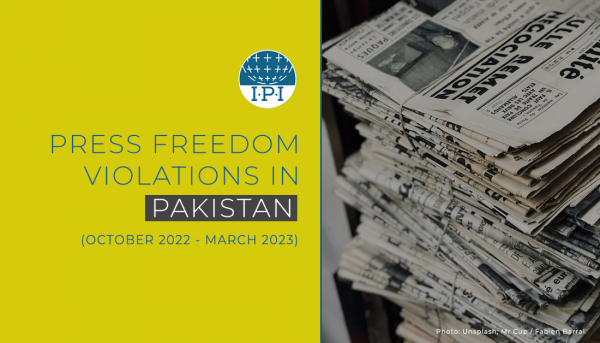The International Press Institute is deeply concerned about reports that a ransom demand has been issued for the release of Pakistani freelance journalist Asad Qureshi, who was reported missing earlier this month. Qureshi was traveling with two retired ISI operatives, Colonel Imam and Squadron Leader Khalid Khwaja, near the town of Kohat in Pakistan’s restive North Western Frontier Province when they were reportedly intercepted by members of the Taliban and taken to an unidentified location.
According to information from the Pakistan Press Foundation, and local media sources, a video released Monday by a hitherto unknown group calling itself the Asian Tigers seems to show the two ISI operatives and demands the release of several top Taliban leaders from Pakistani prisons in exchange for their safety.
According to Pakistan’s Dawn newspaper, the email accompanying the video contains a list of the Taliban leaders to be released and asserts that if they are not released in 10 days, the ISI representatives will be killed.
The email, which is in English and does not mention the journalist, contains the following excerpt, according to Dawn:
“Khalid Khwaja and Col Imam in Taliban custody. Both ISI persons are enemy of Islam and Muslims. We demand released all Taliban leaders, Mullah Brother (Baradar), Mullah Mansoor Dadullah and Mullah Kabir. We will send list of other mujahideen within a few days. Ten days time, if government not released mujahideen, then we will kill ISI officers or other decision.”
Some local media sources say the video contains a clip of Qureshi saying, “My name is Asad Qureshi. I am a British citizen. Please help and set me free. I am being detained by Asian Tigers,”.
“We remain gravely concerned for the safety of the hostages and hope for their safe release,” said IPI Deputy Director Alison Bethel McKenzie. “Qureshi’s kidnapping is part of a growing trend of violence and attacks against the media in the Northwest Frontier Province .”
The North West Frontier Province has witnessed a long-running battle for control between the Pakistani military and tribal and Islamist political factions.
The rising levels of violence have made the region one of the world’s most dangerous for journalists. On Saturday 17 April, Azmat Ali Bangash, a correspondent working part-time for the Associated Press of Pakistan (APP), as well as for Pakistan TV, was killed when two bombs exploded in the Kacha Pakha area of Kohat.
According to IPI’s Death Watch, in the last two years alone 14 journalists have been killed in Pakistan. Seven of the deaths occurred in the Northwest Frontier Province. In August 2009, Aaj TV correspondent Sadiq Bacha Khan was gunned down in broad daylight on his way to work in Mardan, a town in the province. On 4 January 2009, Muhammad Imran, 20 and a trainee cameraman with Express TV, and Saleem Tahir Awan, 45, a freelance reporter with the local dailies Eitedal and Apna Akhbar, were killed when a suicide bomber blew himself up in front of The Government Polytechnic College in Dera Ismail Khan in the North West Frontier Province. And on 18 February 2009, Musa Khankhel, a reporter for Geo TV and the English-language newspaper The News, was shot dead by unidentified gunmen while on assignment covering a peace march led by Muslim cleric Sufi Muhammad in the Swat valley.


